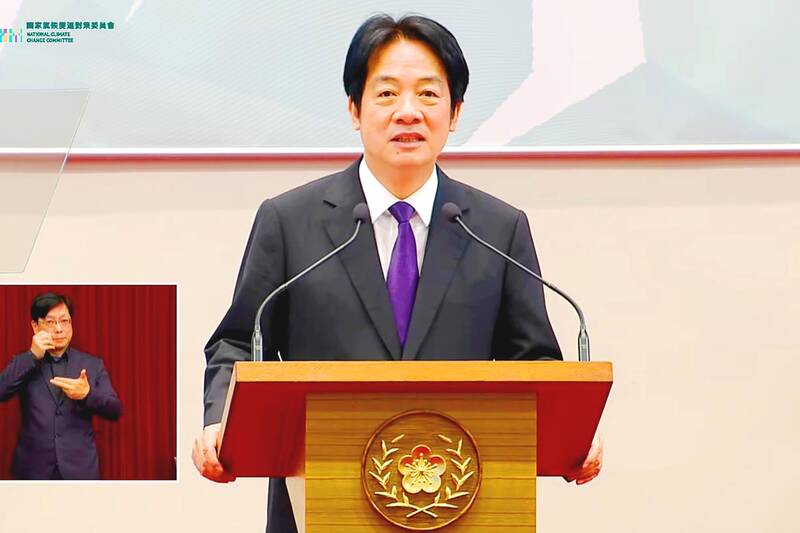The government is committed to implementing a carbon pricing system that would prevent high-carbon-emitting industries from suffering under even greater US tariffs, President William Lai (賴清德) said yesterday at the fourth meeting of the National Climate Change Committee.
US tariff policies pose severe challenges to many Taiwanese industries, especially amid a drive to reduce carbon emissions in the global supply chain, the restructuring of the global trade order and the issue of climate change, he told the meeting focused on “green transition strategies.”
US policies have increased corporate management uncertainties, leading the private sector to adopt a more cautious approach toward implementing carbon reduction measures and adopting the environmental, social and governance (ESG) concept, Lai said.

Photo: screen grab from a Presidential Office livestream
The government recognizes that there is cause for hesitation and would adjust its policies as necessary, he said.
Regardless of developments, Taiwan is committed to transitioning to renewable energy and adopting sustainable development , Lai said, adding that its goals of low carbon emissions and sustainability would make the nation stronger and more resilient.
The government is considering regulations similar to the EU Carbon Border Adjustment Mechanism, which would allow domestic companies to maintain a reasonable and fair competitive edge against foreign companies, he said.
The government would continue to assist the corporate sector, especially small and medium-sized enterprises, in reducing carbon emissions and meeting international standards, he added.
The integration of domestic resources, promotion of the “circular economy” concept and ensuring that Taiwanese industries meet international standards on key issues would make Taiwan more visible as a nation committed to reducing carbon emissions and striving for sustainability, Lai said.
The financial sector can also play a key role in promoting transitions to net zero or sustainable development, he said.
The sector can incorporate the ESG concept into various programs or tools, such as making ESG an indicator for credit assessments, and help foster greater awareness — both among the corporate sector and the broader public — of climate change, its effects and its inherent risks, Lai said.
As a key player in Asia’s financial system, Taiwan can build its influence in the region by adopting ESG and promoting sustainable finance, he said.
The government would work with academia, civic groups, the corporate sector and industries to formulate actionable plans for reducing carbon emissions in energy production, manufacturing, transportation, agriculture and the broader environment, he added.
The Ministry of Environment is also working with vocational universities to develop a program that fosters “green-collar” talent, Lai said.
Schools are now incorporating climate and net zero-related online courses to help the younger generation grow up to lead Taiwan into a better and more sustainable future, he said.

A magnitude 6.4 earthquake struck off the coast of Hualien County in eastern Taiwan at 7pm yesterday, the Central Weather Administration (CWA) said. The epicenter of the temblor was at sea, about 69.9km south of Hualien County Hall, at a depth of 30.9km, it said. There were no immediate reports of damage resulting from the quake. The earthquake’s intensity, which gauges the actual effect of a temblor, was highest in Taitung County’s Changbin Township (長濱), where it measured 5 on Taiwan’s seven-tier intensity scale. The quake also measured an intensity of 4 in Hualien, Nantou, Chiayi, Yunlin, Changhua and Miaoli counties, as well as

Taiwan is to have nine extended holidays next year, led by a nine-day Lunar New Year break, the Cabinet announced yesterday. The nine-day Lunar New Year holiday next year matches the length of this year’s holiday, which featured six extended holidays. The increase in extended holidays is due to the Act on the Implementation of Commemorative and Festival Holidays (紀念日及節日實施條例), which was passed early last month with support from the opposition Chinese Nationalist Party (KMT) and Taiwan People’s Party. Under the new act, the day before Lunar New Year’s Eve is also a national holiday, and Labor Day would no longer be limited

COMMITMENTS: The company had a relatively low renewable ratio at 56 percent and did not have any goal to achieve 100 percent renewable energy, the report said Pegatron Corp ranked the lowest among five major final assembly suppliers in progressing toward Apple Inc’s commitment to be 100 percent carbon neutral by 2030, a Greenpeace East Asia report said yesterday. While Apple has set the goal of using 100 percent renewable energy across its entire business, supply chain and product lifecycle by 2030, carbon emissions from electronics manufacturing are rising globally due to increased energy consumption, it said. Given that carbon emissions from its supply chain accounted for more than half of its total emissions last year, Greenpeace East Asia evaluated the green transition performance of Apple’s five largest final

Taiwan is to extend its visa-waiver program for Philippine passport holders for another year, starting on Aug. 1, Minister of Foreign Affairs Lin Chia-lung (林佳龍) said on Friday. Lin made the announcement during a reception in Taipei marking the 127th anniversary of Philippine independence and the 50th anniversary of the establishment of the Manila Economic and Cultural Office (MECO) in Taiwan, the Ministry of Foreign Affairs said. The decision reflected Taiwan’s commitment to deepening exchanges with the Philippines, the statement cited Lin as saying, adding that it was a key partner under the New Southbound Policy launched in 2016. Lin also expressed hope